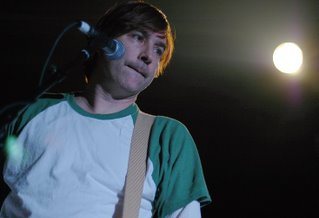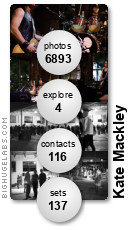
Ken Bethea, lead guitarist of the Old 97s, lives the life musicians aspire to: he doesn’t have a day job, can make a call and get his band on a Starbucks compilation, and not play SxSW because they can get better gigs. Life’s good these days for the “97s.” Even with half the band split between the coasts with bassist Murry
DMG: You guys just had a DVD come out, right?
KB: I haven’t seen it, I don’t own a copy; it wasn’t something that we had a lot to do with. What I did have a lot to do with, is we have a song on the Valentine’s 2005 Starbucks compilation, Sweethearts. I was at the Casa Linda Starbucks last summer, and it was raining, I stopped in to get a cup of coffee. We’ve been on a couple compilations, but none in five years. I always liked those Starbucks compilations; I always picked them up and looked at them, to see who’s on. I picked one up and I saw all the usual suspects, but us, that are in this whole thing. You know; Lucinda Williams, Ryan Adams, and I’m like, ‘Why are we not on this? It’s stupid.’ It’s because our former management didn’t push. I went home that day, immediately sent an email to our current management and said, ‘We need to be back in the Starbucks loop.’ Of all the little one-of things you do, it gets noticed; people buy those things. By the end of that day, we were on that compilation. It took four hours and two months later, we’re over on lower
DMG: Just from walking into the Starbucks at Casa Linda?
KB: Just from saying I want to get this done.
DMG: So how is that now? Does that feel nice that you can make a couple phone calls and get what you want to happen?
KB: (blows raspberry) Yes, of course! Compared to the beginning, when you didn’t have anything? The whole thing in the Old 97s has been amazingly cool. Every single stop along the way, from the days that we played for tips, to the days when we paid our own, did what we could do to go on tour, and just humped it and lived on people’s floors, to these days where we make money -we’re not rich, but we’re not poor- and we can live in a decent neighborhood and we don’t have jobs. I don’t have a boss. (under his breath) Well, my wife. (laughs) But I don’t have any other kind of boss. I haven’t had a boss since 1993. Feb 26th, 1993, as a matter of fact. My anniversary’s coming up! It’s amazing to be part of the national music community, where you make two phone calls and you make something happen and not have to pander. When you’re in a band that ultimately can’t make somebody else some money, you always have to go, ‘Come on… Come on….’ You feel like you’re always asking for a favor. But when you can carry your own weight, even if it’s not the weight of Paul McCartney, it’s still weight. You don’t have to go, (dejectedly) ‘We’re having a hard time getting a gig in
DMG: What’s your advice to young bands?
KB: Promote your shows when you play ‘em. Make posters. Play as often as possible and if you can play for free, that’s good. Because when you play for free, you can invite all your friends, your friends can invite their friends, and you can actually have a scene. You can have forty-five people show and you won’t have to feel guilty, and you won’t have to deal with the guest list, and they can come. Everybody can come. And at that point, if your music is any good, they will become fans. If your music’s not good, you’re screwed anyway, doesn’t matter. But if it’s good enough… That’s how we got fans. We played at (ticking them off on his fingers) Chumley’s, the Barley House, Bar of Soap -constantly- for a year and a half, and became everyone’s favorite neighborhood band that was not a big band, just a little band. But the fact that all these people could come see us for free, instead of going, ‘well, you know, they’re playing at Trees, and that’s $6…’ That’s not good, because you have to realize you ain’t worth six bucks in the beginning. You’re just not. You’re worth free; you’re worth fifty cents or a dime. You’re worth the tip bucket. And then, promote your shows. ‘Cause songwriting and all that, the creative process is what is reality with you. You gotta deal with that yourself. You can’t do anything … if your songwriting sucks, it just sucks. I mean, you can go to songwriting class, or something (chuckles), work on that. But you can always make posters, book the gigs.
DMG: What’s the future of the Old 97s?
KB: Record every two years, touring every summer. Then a lot when records are out, occasional things like Starbucks. Right now the immediate future is a Christmas album to come out this Christmas and a live album to come out either in the fall or next winter. I just had a call on that Friday, so the wheels are in motion. I’ve always wanted to do a Christmas album, so hopefully we won’t screw it up, because I love Christmas music. We’re trying to do the live album recording in April or May. There’s a place called Green Hall, which is down in
DMG: You mentioned that Sons of Hermann Hall is your favorite venue in
KB: That’s one of them. I like the
DMG: What’s your best memory from there?
KB: The night we played with John Doe from X and all the power went off. Us four and John Doe on stage, playing an X song and the power went off. It was great, I mean it was cool, it was so much fun.
DMG: So, what’d you guys do?
KB: Stood there, just like we always do. It happened four months ago in
DMG: You write, on your website, that “Drag It Up” is your most personal album.
KB: Oh, yeah. Yeah. I would definitely think it’s more introspective. Different albums have a tendency to take on a little bit of a life or a personality. We’ve had some albums where we’ve worked on energy and lifestyle, like drinking and chasing girls and partying and all that kind of stuff, and we’ve had some albums where we worked on song technique and how to actually make cool songs, like good-sounding songs. It doesn’t actually make the fans like it any better, but from a musician’s point of view, we wanted to get to that. Which is what we did with “Fight Songs” and “Satellite Rides.” We tried to get some emotional depth recorded on this album. We let some vocal sections spill out a little longer, whereas we had to lop that off on “Fight Songs” and “Satellite Rides.” We had to tighten those songs down to three minutes, on purpose. Because that’s what pop songs are, like classic Beatles pop songs are, bam, 2 minutes 45 seconds, or whatever. We let the songs on the album exist, and tried not to cram them, either pump them full of energy and speed, or tighten them into pop. Just put more acoustic, strummy stuff on it, so it’s good. I enjoy it. I was real happy with it.
DMG: Do you feel like your songwriting style has changed since you’ve had a family?
KB: I think more than anything, our lives are so different. A lot has to do with family. Yeah, it has changed a lot. In the beginning you really are playing in your band, drinking, and chasing girls. I mean, that’s what you’re doing. We were all single, and it’s representative. You listen to our first three albums and that’s what every single song’s about. I don’t know if we’ll ever be musicians that are gonna write songs directly about our children, but the fact that your life is stable and you have a nice neighborhood… it comes out, you know. You’re not writing about hoping you can cover rent.
DMG: I work with a lot of bands that are just starting. In fact, I’ve been asked why I want to cover local bands. You guys are a little more popular than I’m used to.
KB: You know, most people equate a band they’ve never heard of with ‘music must not be good,’ or that local bands must not be good. That’s totally, totally wrong. I went to college at UT and got into that world of little indie local bands that it was a big deal if they sold 500 records. And when I got over that hurdle that they could still be good, that they were just as good as these [major label bands], it was totally liberating. You’re like, ‘Hey, it’s good music.’ It’s just better than Phil Collins or whatever was popular at that time, or Prince.
DMG: Do you think that the music scene in
KB: Not recently. It changed in the 90s; it went from non-existent in the 70s, or very dinky in the 70s, to the burgeoning Deep Ellum community that started in about ’85, to mainstream in the 90s. But not any different between now and what it was ten years ago, I don’t think.
DMG: I get the feeling from other bands that there’s a little bit more of a momentum, just recently, just in the past year.
KB: Well, I think that maybe at the micro-level, you know, maybe if you’re down there and you’re sweating it out at the level of Deathray and Chomsky or whatever, or maybe a little lower than that, you’re much more in contact then with the ebb and flow. But from -for lack of a better term- from the top of the heap looking down, it’s still... it’s healthy. I think that maybe they probably thought it might have been worse three years ago, ‘cause in their mind maybe their band wasn’t doing as well. Whereas, now “Hey, man, a little more momentum...” and really it’s more personal. Most of the time when you’re measuring anything in life, it’s real personal. I talk to fans who tell me, “Your set’s the greatest thing I’ve ever seen” and you talk to the next one and they say, “You guys were a little bit off tonight” and if you really get down to it, one of them had a double espresso on the way in and the other one drank four beers and ate a giant burger and dude, you’re worn out, you’re done before you even got here!
DMG: So it’s hard to judge how you’re doing?
KB: In the beginning, you suck. There’s just no way around it, all bands suck. I sucked, I was horrible. My first band with Phil, it was beyond horrible. Just terrible. Rhett sucked when he was 15. That’s just part of it, you get better, and the difference between a good live band, like Deathray Davies, and Eisley is miles apart. Everybody does studio tricks. It’s not like somebody’s more legit than somebody else. It’s what you do in there. Everybody’s been cheating for years in the studio. But Eisley has potential to be a great studio band, ‘cause their songs are cool-sounding. They look great, so the potential for them to be big is bigger than Deathray. I don’t think they have any tour base at all.
DMG: Well, they toured with Snow Patrol…
KB: Doesn’t matter. That’s zero. If you’re opening for anybody, that normally is zero. No, it’s not zero, it’s point five. I mean, so what, so you’re opening up for some band, you go up and play there and five thousand people come? You go back a month later, you play your own band, your own gig, you’ve got two hundred people there. If they have fun, the next time you come, you’ll have four hundred people there. But if they don’t have fun, the next time you come, you’ll have 75. If that. It’s point five. Opening is completely nothing. We opened for big bands and not once has it ever made any real difference in anything. We sold an extra thousand records. It doesn’t change your life, normally. It’s rough, in the beginning. Like Dylan Silvers and [DARYL]; I’ll think well, they’re just getting started. They’re not. They’ve made four or five albums and been at it, and know what a tuner is. In the beginning, most bands are all like, ‘I don’t know what a PA is.’ It’s like one time, this band was opening for us at Sons of Hermann... normally, now we take control of who opens for us, but for whatever reason we didn’t, and the band that was opening up literally was a brother-in-law of somebody at Sons. We’d never heard of them, but what was very -in the band world- in poor taste for them, was that they’d never heard of us. That doesn’t get you anywhere with the headliners, to kind of walk in and go “You guys are from here?” and you’re like, OK, so you’re not really part of the
The Old 97s are gassing up the blue van and heading out on tour again. Check their website for details on the summer schedule and more ‘97s site updates as soon as Ken finishes up doing his taxes.
© Dallas Music Guide 2005







No comments:
Post a Comment